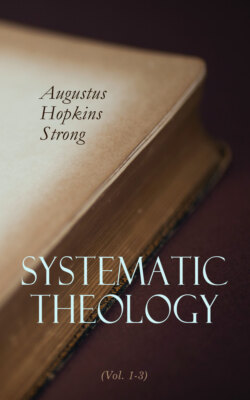Читать книгу Systematic Theology (Vol. 1-3) - Augustus Hopkins Strong - Страница 61
На сайте Литреса книга снята с продажи.
4. Amount of Testimony necessary to prove a Miracle.
ОглавлениеThe amount of testimony necessary to prove a miracle is no greater than that which is requisite to prove the occurrence of any other unusual but confessedly possible event.
Hume, indeed, argued that a miracle is so contradictory of all human experience that it is more reasonable to believe any amount of testimony false than to believe a miracle to be true.
The original form of the argument can be found in Hume's Philosophical Works, 4:124–150. See also Bib. Sac., Oct. 1867:615. For the most recent and plausible statement of it, see Supernatural Religion, 1:55–94. The argument maintains for substance that things are impossible because improbable. It ridicules the credulity of those who “thrust their fists against the posts, And still insist they see the ghosts,” and holds with the German philosopher who declared that he would not believe in a miracle, even if he saw one with his own eyes. Christianity is so miraculous that it takes a miracle to make one believe it.
The argument is fallacious, because
(a) It is chargeable with a petitio principii, in making our own personal experience the measure of all human experience. The same principle would make the proof of any absolutely new fact impossible. Even though God should work a miracle, he could never prove it.
(b) It involves a self-contradiction, since it seeks to overthrow our faith in human testimony by adducing to the contrary the general experience of men, of which we know only from testimony. This general experience, moreover, is merely negative, and cannot neutralize that which is positive, except upon principles which would invalidate all testimony whatever.
(c) It requires belief in a greater wonder than those which it would escape. That multitudes of intelligent and honest men should against all their interests unite in deliberate and persistent falsehood, under the circumstances narrated in the New Testament record, involves a change in the sequences of nature far more incredible than the miracles of Christ and his apostles.
(a) John Stuart Mill, Essays on Theism, 216–241, grants that, even if a miracle were wrought, it would be impossible to prove it. In this he only echoes Hume, Miracles, 112—“The ultimate standard by which we determine all disputes that may arise is always derived from experience and observation.” But here our own personal experience is made the standard by which to judge all human experience. Whately, Historic Doubts relative to Napoleon Buonaparte, shows that the same rule would require us to deny the existence of the great Frenchman, since Napoleon's conquests were contrary to all experience, and civilized nations had never before been so subdued. The London Times for June 18, 1888, for the first time in at least a hundred years or in 31,200 issues, was misdated, and certain pages read June 17, although June 17 was Sunday. Yet the paper would have been admitted in a court of justice as evidence of a marriage. The real wonder is, not the break in experience, but the continuity without the break.
(b) Lyman Abbott: “If the Old Testament told the story of a naval engagement between the Jewish people and a pagan people, in which all the ships of the pagan people were absolutely destroyed and not a single man was killed among the Jews, all the sceptics would have scorned the narrative. Every one now believes it, except those who live in Spain.” There are people who in a similar way refuse to investigate the phenomena of hypnotism, second sight, clairvoyance, and telepathy, declaring a priorithat all these things are impossible. Prophecy, in the sense of prediction, is discredited. Upon the same principle wireless telegraphy might be denounced as an imposture. The son of Erin charged with murder defended himself by saying: “Your honor, I can bring fifty people who did not see me do it.” Our faith in testimony cannot be due to experience.
(c) On this point, see Chalmers, Christian Revelation, 3:70; Starkie on Evidence, 739; De Quincey, Theological Essays, 1:162–188; Thornton, Old-fashioned Ethics, 143–153; Campbell on Miracles. South's sermon on The Certainty of our Savior's Resurrection had stated and answered this objection long before Hume propounded it.
